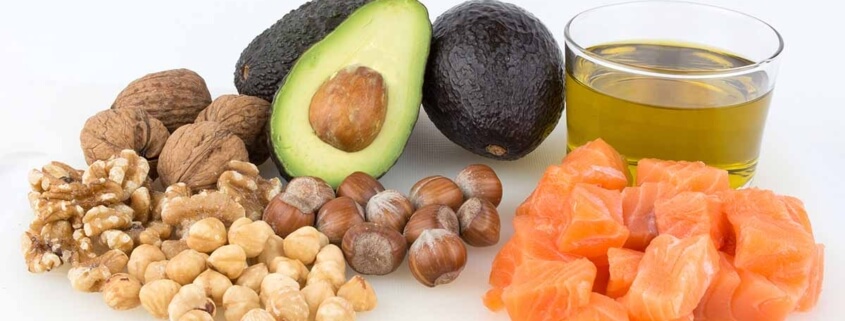Your Guide to Healthy Fats
Few words have been demonized in the world of nutrition like “fat.” But fat isn’t actually a bad thing. It’s one of the three basic nutrients—along with protein and carbohydrates—that provide our bodies with energy. Fat contains fatty acids that we need to take in through our diet. Certain vitamins, known as fat-soluble vitamins, require fat to dissolve and get used by our bodies.
You’ve probably heard by now that there are so-called good fats and bad fats. It’s important to understand the differences, so I’d like to help you get a handle on how fats affect your health.
Types of Fat
There are 3 major categories of dietary fat:
- Unsaturated fats (which are divided into monounsaturated fats and polyunsaturated fats)
- Saturated fats
- Trans fat
Let’s just dispense with one of them right here. Trans fat is terrible for you. While it does occur naturally in tiny amounts in some foods, it’s mostly a byproduct of a food processing technique called hydrogenation.
You shouldn’t eat it. Fortunately, while it was widely found in processed foods until recently, it’s largely been phased out as word got out just how terrible it is for us. Look at the nutrition label on food packages and check the fat section to confirm the item contains 0 grams of trans fat per serving.
Unsaturated and Saturated Fats
Unsaturated fats are considered the good or healthy fats, while saturated fat is generally referred to as the bad or unhealthy fat. Unsaturated fats, which are liquid at room temperature, are found more abundantly in plant-based foods and oils, as well as fish and shellfish; saturated fats, which are solid at room temperature, are most significantly found in animal products, especially red meats (beef, pork, venison, etc.), poultry skin, and dairy products, as well as in coconut and palm oils.
For our purposes here, there’s not much point in delving into the differences between mono and polyunsaturated fats. Both are good for you, and it’s important to get both in your diet. And if you’re wondering about the widely touted omega-3 fatty acids, it’s a type of polyunsaturated fat.
Also, an important note: Omega-3 fatty acids are great for you for many reasons. Fatty fish, nuts and seeds, and plant-based oils are good sources, and taking a supplement like fish or flaxseed oil is often beneficial (remember to check with your doctor first). But you need to balance your intake of omega-3 and omega-6 fatty acids (another polyunsaturated fat). Otherwise, you diminish the benefits or possibly even do some harm in the long run. Standard recommendations range from a 4:1 to 2:1 ratio of omega-6 to omega-3.
Does Fat Make You Fat?
Fat has a longstanding reputation for making you fat and raising your cholesterol. But unsaturated fats promote healthy cholesterol levels. Saturated fats, however, can contribute to elevated bad (LDL) cholesterol levels and triglycerides, and it can clog your arteries.
As for whether dietary fat increases your body fat, it’s a question of caloric intake. You gain weight when you eat more calories than you burn. Fat contains more than twice as many calories as the two other energy-providing nutrients; protein and carbs contain 4 calories per gram, while fat contains 9 calories per gram.
That’s why something like nuts, a widely recommended healthy snack, have to be eaten in moderation; while they’re rich in nutrients, that includes high-calorie unsaturated fats. So, you can easily consume more calories with fatty foods, which in turn can lead to weight gain. On the upside, though, fatty foods tend to be more filling, so if you pay attention to your body’s hunger and fullness cues, you can balance the higher calories with smaller portions.
The bottom line is, overeating (and under-exercising) makes you fat. If you consume more calories than you use, you gain weight. The general recommendation is that you get between 20 and 35 percent of your daily calories from fats.
Benefits of Healthy Fats
A diet rich in unsaturated fats has been shown to have lots of benefits. As noted, it promotes healthy cholesterol levels, which reduces your risk of heart disease, heart attack, stroke, and a number of other chronic and potentially deadly illnesses.
Unsaturated fats—and particularly omega-3 fatty acid—also promote joint, skin and hair health, and they may help prevent cognitive decline and other problems associated with aging. Unsaturated fats are a great source of sustained energy, as well.
Healthy Fat Sources
As mentioned above, red meat, poultry skin, and full-fat dairy products are the main sources of saturated fat in our diet. The following foods are some of the best sources of healthy unsaturated fats:
- Fatty fish (e.g., salmon, tuna, mackerel, trout, sardines, herring)
- Nuts and seeds (e.g., walnuts, pecans, almonds, pistachios, flaxseed, hemp seeds, sunflower seeds)
- Vegetable and seed oils (e.g., canola, soybean, corn, flaxseed, peanut, sunflower, safflower)
- Legumes (e.g., soybean, beans, peanuts)
- Avocado



